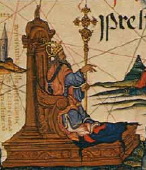
In the mid-twelfth century, at a time when European rulers felt threatened by the growing power of Muslim nations on their borders, a letter suddenly appeared from Prester John, who described himself as a Christian king of great wealth living in the far east. The letter was addressed to the Byzantine emperor Manuel Comnenus.
Prester John claimed to be a descendant of one of the Three Magi. He wrote that his kingdom stretched from India to the land where the sun rises, and that it was inhabited by fantastic creatures such as seven-horned bulls, birds so large they could lift and kill an armored man, and horned men with three eyes in the back of their heads. He even claimed there was a fountain of perpetual youth in his kingdom.
The letter circulated throughout all the European courts. In 1177, Pope Alexander III instructed his personal envoy to travel east, search for Prester John, and deliver a reply to his letter. It was hoped Prester John would come to the aid of the Christian nations in Europe, but no response ever came. Nevertheless, European explorers continued to search for the mythical king for centuries.
The true author of the letter remains unknown. Whoever it was, he was familiar with old legends, which he borrowed heavily from — legends such as the tales of Alexander the Great’s adventures in the East. Linguistic evidence suggests the letter originated in Italy. The author probably intended to offer hope to the Christian armies fighting the crusades, and in this respect he succeeded, even though the hope was a false one.

 In the mid-twelfth century, at a time when European rulers felt threatened by the growing power of Muslim nations on their borders, a letter suddenly appeared from Prester John, who described himself as a Christian king of great wealth living in the far east. The letter was addressed to the Byzantine emperor Manuel Comnenus.
In the mid-twelfth century, at a time when European rulers felt threatened by the growing power of Muslim nations on their borders, a letter suddenly appeared from Prester John, who described himself as a Christian king of great wealth living in the far east. The letter was addressed to the Byzantine emperor Manuel Comnenus.
Comments